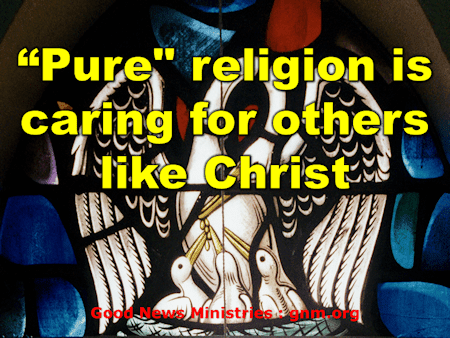Twenty-second Sunday in Ordinary Time, Year B (September 2, 2018): Honoring God with our hearts
Thứ Bảy, 01-09-2018 | 15:00:46

Today’s Readings:
Deuteronomy 4:1-2, 6-8
Ps 15:2-5
James 1:17-18, 21b-22, 27
Mark 7:1-8, 14-15, 21-23
www.usccb.org/bible/readings/
USCCB Podcast of the Readings:
ccc.usccb.org/cccradio/
A reading from the Holy Gospel according to Mark.
When the Pharisees with some scribes who had come from Jerusalem
gathered around Jesus,
they observed that some of his disciples ate their meals
with unclean, that is, unwashed, hands.
—For the Pharisees and, in fact, all Jews,
do not eat without carefully washing their hands,
keeping the tradition of the elders.
And on coming from the marketplace
they do not eat without purifying themselves.
And there are many other things that they have traditionally observed,
the purification of cups and jugs and kettles and beds. —
So the Pharisees and scribes questioned him,
“Why do your disciples not follow the tradition of the elders
but instead eat a meal with unclean hands?”
He responded,
“Well did Isaiah prophesy about you hypocrites, as it is written:
This people honors me with their lips,
but their hearts are far from me;
in vain do they worship me,
teaching as doctrines human precepts.
You disregard God’s commandment but cling to human tradition.”
He summoned the crowd again and said to them,
“Hear me, all of you, and understand.
Nothing that enters one from outside can defile that person;
but the things that come out from within are what defile.
“From within people, from their hearts,
come evil thoughts, unchastity, theft, murder,
adultery, greed, malice, deceit,
licentiousness, envy, blasphemy, arrogance, folly.
All these evils come from within and they defile.”
Good News Reflection: Honoring God with our hearts
In the Gospel reading this Sunday, Jesus chastises the Pharisees for honoring God only with their lips while their hearts were far from him; love was missing from their analysis of whether or not Jesus and his disciples had sinned when they disobeyed a Jewish rule about cleanliness.
The rule was more important to them then the person. They had the self-righteous attitude of: “I know better than you, and I am better than you, proven by the fact that I obey the laws that you’re breaking.”
Obedience, when motivated by a self-righteous adherence to rules, is hypocrisy. It uses the law as an opportunity to feel superior to others. A modern example might be when someone tells a priest that he is sinning because he isn’t adhering exactly to the norms for Mass as prescribed in the General Instruction of the Roman Missal. If he or she doesn’t stop to understand why the priest believes the adaptations are allowable and pastoral, who really is the sinner?
When this happens, “in vain do they worship me,” Jesus says. The meaning of the Mass has been lost.
There is a hierarchy of rules and laws. Some rules change with the needs of the times. Of greatest importance are the Commandments of God, the Moral Laws, which never change. All of them are supposed to help us on our journey to heaven.
It is right to speak up when we witness disobedience, and we shoulddo it, but only because we care about the sinner’s spiritual growth and only when we can handle it without ignoring or overlooking the reasons behind the disobedience. We are most successful in guiding others into greater holiness when we take the time to first understand the roots of their disobedience and then address those concerns with love.
This is how we become, as the second reading says, “doers of the word and not hearers only”, because, as James adds, “pure” religion is caring for others. The Pharisees in the Gospel story didn’t care about the hunger of the disciples.
Questions for Personal Reflection:
How do you know when you’re being hypocritical in your faith? How do you handle the discovery that you’ve done something uncaring?
Questions for Community Faith Sharing:
Give an example of a Moral Law and an example of a regulation that was instituted by the Church to address a specific need for a specific time. How do they differ in importance? Name one of the 10 Commandments or a teaching of the Church and explain how it became an opportunity for you to become more like Christ.
Today’s Prayer:
Lord Jesus: May Your Spirit fill all my being, and may Your Word take its place in me. May all my works, thoughts and words fulfill the purpose You planned for me. Amen.
© 2018 by Terry A. Modica
Tags: Good News Reflection, Holy Gospel according to Mark, Twenty-second Sunday in Ordinary Time, Twenty-second Week in Ordinary Time, Year B
Có thể bạn quan tâm
- Saturday of the Twenty-first Week in Ordinary Time (September 1, 2018): Do you enjoy God's gifts?
- Friday of the Twenty-first Week in Ordinary Time (August 31, 2018): Who's the fool?
- Thursday of the Twenty-first Week in Ordinary Time (August 30, 2018): When Jesus comes for you
- Wednesday of the Twenty-first Week in Ordinary Time (August 29, 2018): Memorial of the Passion of Saint John the Baptist
- Tuesday of the Twenty-first Week in Ordinary Time (August 27, 2018): Memorial of Saint Augustine, Bishop and Doctor of the Church
- Monday of the Twenty-first Week in Ordinary Time (August 26, 2018): Memorial of Saint Monica
- Twenty-first Sunday in Ordinary Time, Year B (August 26, 2018): Looking beneath the surface to find Jesus

